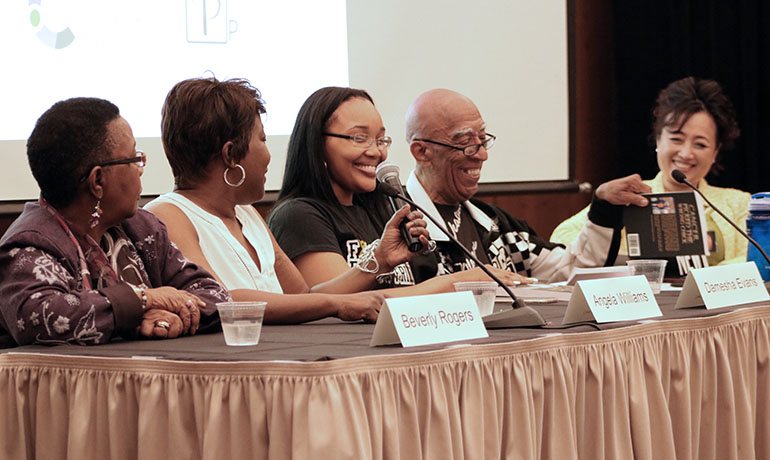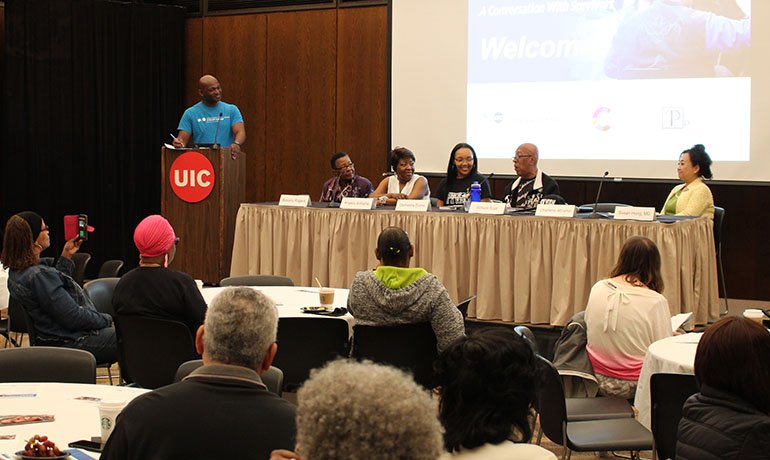
“Your doctors should be telling you what’s going on with your bodies…what treatments you’ll be getting.”
That’s the diagnosis Susan Hong, MD, director of survivorship at the University of Illinois Cancer Center, recommended to those in attendance at the recent survivorship event titled “Cancer Impacts All of Us: A Conversation with Survivors Panel Discussion, Overview of Clinical Trials, Advocacy and Actions.”
 Hosted by the University of Illinois Cancer Center’s Patient Brigade, more than 90 survivors, caregivers and health professionals attended the event that was held to commemorate the 32nd anniversary of National Cancer Survivors Day. The Patient Brigade is a group of current cancer patients, survivors and caregivers who work in partnership with the UI Cancer Center to ensure health equity through education, training and community engagement. The day’s event was led by Brigade member Phyllis Rodgers, a colon cancer survivor and director of Peer Plus Wellness, and began with a panel moderated by Karriem Watson, DHSc, MS, MPH, associate director of Community Outreach and Engagement at the UI Cancer Center.
Hosted by the University of Illinois Cancer Center’s Patient Brigade, more than 90 survivors, caregivers and health professionals attended the event that was held to commemorate the 32nd anniversary of National Cancer Survivors Day. The Patient Brigade is a group of current cancer patients, survivors and caregivers who work in partnership with the UI Cancer Center to ensure health equity through education, training and community engagement. The day’s event was led by Brigade member Phyllis Rodgers, a colon cancer survivor and director of Peer Plus Wellness, and began with a panel moderated by Karriem Watson, DHSc, MS, MPH, associate director of Community Outreach and Engagement at the UI Cancer Center.
“Most people think of survivorship as, ‘After you’re done with your treatment, here’s your plan.’ It’s really about – cancer hits you and impacts your life the day you’re diagnosed with cancer,” Hong said. “People walk into cancer with other issues going on in their life. Your caregiver, your physician, they should really understand who you are, what your background is, what your health issues are, and work with you to minimize the toxicities of treatment and minimize the long-term complications and try to avoid as much of it as possible. If you don’t implement this model, you’re really doing yourself a disservice.”
Watson listed ways on how conversations between health care professionals and patients need to be put into action. He mentioned how some people lack the financial means to afford many of the medications they are prescribed, atop of the high taxes they already have to pay.
“Patients and families need to be offered the proper psycho-social support – anything from counseling, to family therapy, to even grief counseling,” he said. Watson also discussed the language barriers some people might have with cancer care. “When you even translate the words ‘research investigation’ into Spanish,” it comes off to the Latino community as, ‘police…you’re investigating me?”
National Cancer Survivor’s Day is part of a month-long celebration held every year in June to celebrate survivorship and to “show that patients and their caregivers go on to enjoy their lives in meaningful and impactful ways after a cancer diagnosis,” said Kimberly Richardson, an ovarian cancer survivor who is project coordinator for the UI Cancer Center’s PCORI (Patient Centered Outcomes Research Institute) grant.
Richardson and Candace Henley, a Patient Brigade member who is a colon cancer survivor, shared how survivorship has led them to various phases of advocacy. “We need to talk to family members and friends about their cancer diagnosis and treatment, to get involved with fundraising efforts, and to take opportunities to speak with elected officials about cancer research,” Richardson said.
The event concluded with a panel discussion on the importance of minority participation in clinical trials, led by UI Cancer Center’s Meredith Russell, clinical research manager in the clinical trials office, and Cassandra Smith and Charlene Abrams, representatives from Janssen Pharmaceuticals.
For more information on the UI Cancer Center’s Patient Brigade, visit: https://cancer.uillinois.edu/community/patient-brigade-members/
Learn more about the PCORI grant here: https://www.pcori.org/research-results/2018/engaging-patient-stakeholders-informing-research-and-engagement-ui-cancer
